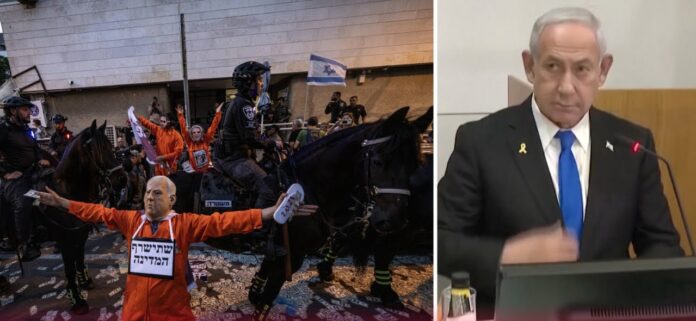After weeks of defence testimony, Prime Minister Netanyahu confronts prosecutors’ cross-examination in a key corruption case, with judges’ earlier doubts adding pressure on the prosecution
Israeli Prime Minister Benjamin Netanyahu entered a critical stage of his high-profile corruption trial on Tuesday, facing cross-examination by state prosecutors for the first time since the proceedings began nearly two years ago.
Until now, Netanyahu’s testimony spanned 29 hearings, predominantly led by his defence attorney Amit Haddad. However, this phase marks a turning point as prosecutors Yehudit Tirosh and Yonatan Tadmor took over questioning, signalling the trial’s intensifying scrutiny.
Presiding Judge Rivka Friedman-Feldman opened the session with a solemn reminder to Netanyahu that “the obligation to tell the truth remains in effect until the end of your testimony,” underscoring the seriousness of the moment.
The early focus of the cross-examination centred on the extraordinary conditions that governed Netanyahu’s prior police interrogations. Prosecutor Tadmor questioned whether all eight sessions had been pre-arranged through the Prime Minister’s Office. Netanyahu confirmed this, citing his official duties as justification: “It wasn’t possible to come to me by surprise.”
This scrutiny comes amid the backdrop of Case 4000, which alleges Netanyahu’s involvement in a corruption scheme tied to telecom giant Bezeq. Prosecutors contend that Netanyahu knew of and directed Shlomo Filber, a former communications minister, to facilitate regulatory favours for Bezeq in exchange for favourable coverage by the Walla news site.
Two years ago, judges expressed significant reservations about the strength of the prosecution’s corruption charges in this case, even recommending they be dropped. Nevertheless, the prosecution opted to proceed, arguing that Netanyahu’s direct cross-examination might uncover crucial new evidence.
The prosecution is now navigating what many regard as a make-or-break moment in the trial. This phase offers possibly their last chance to convincingly prove that Netanyahu was not only aware of the scheme but actively orchestrated it.
Under his defence team’s guidance, Netanyahu’s prior answers were often narrative-driven and elaborate. Now, however, he is compelled to respond directly and succinctly to pointed questions—a format that may expose inconsistencies or admissions critical to the case.
Observers and legal experts see this stage as pivotal in shaping public and judicial perception of Netanyahu’s culpability. The outcome could determine whether the charges withstand the intense scrutiny or collapse due to insufficient evidence.
Netanyahu’s defence team remains resolute, arguing that the prosecution’s case is based on conjecture and political motivation, insisting their client acted lawfully throughout. Meanwhile, prosecutors are pressing to highlight any contradictions or signs of knowledge and intent that may tilt the scales.
The trial’s progress continues to draw significant national and international attention, as Netanyahu remains Israel’s longest-serving prime minister and a polarising figure in Israeli politics.
As cross-examination proceeds, all eyes are on Netanyahu’s responses, which could ultimately shape both the legal fate of a sitting prime minister and the broader political landscape of Israel.
